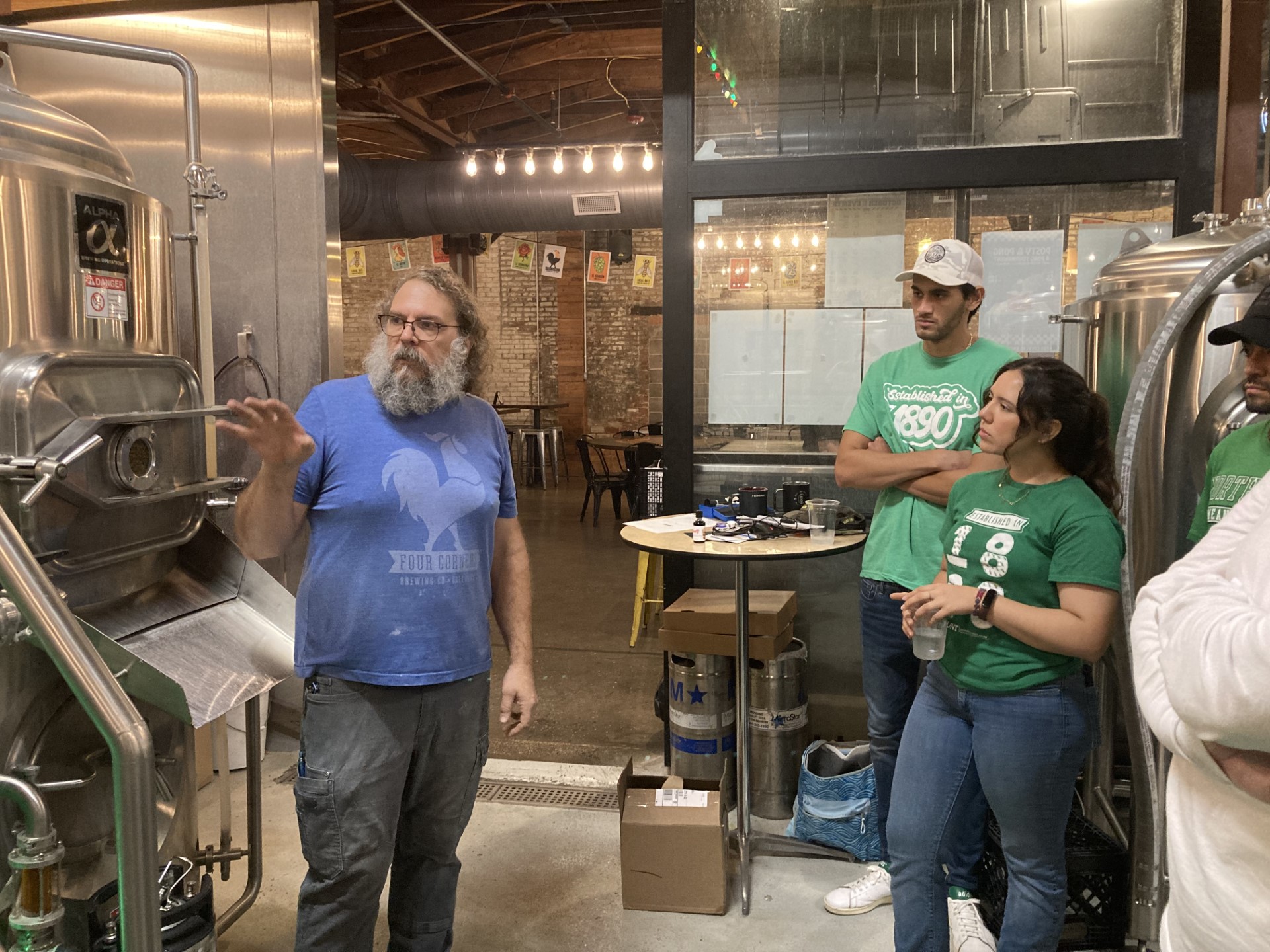Enology & Brewing
Overview
The Enology and Brewing Undergraduate Minor program offered by the College of Applied and Collaborative Studies provides a multidisciplinary education in the principles underlying wine and beer production and distribution, including hands-on project-based learning in viticulture and fermentation. We’ve developed the curriculum with input from industry leaders and experts, as well as consulting with others who have taught and done extensive research in the field. This is exclusively offered at UNT at Frisco.
Minors and certificates cannot be added to your official degree plan until Fall 2025. While courses for the minor and certificate are available, they cannot be officially included in your plan until then.
CERTIFICATE (12 credit hours)
Required (9 credit hours):
AMDS 3900 Principles of Viticulture
Introduces the basic principles underlying cultivation, growing, and harvesting of grapes for production of wine as well as fundamentals of malt production, storage, and roasting for beer production. Also covers different types of malts, significance of varying malt biochemical composition, styles of malt roasting, and industry trends.
Spring 2025 Course code:
CACS 4980 Experimental Course: Principles of Viticulture
AMDS 3910 Principles of Enology
Introduces the basic principles of enology including the history and development of the wine industry; factors affecting wine quality; winemaking operations including harvest, scheduling, crushing, fermentation, and record keeping.
Spring 2025 Course code:
AMDS 4980 Experimental Course: Principles of Enology
AMDS 3920 Principles of Brewing
Introduces the basic beer manufacturing principles including the history and development of the beer industry; factors affecting beer quality, brewing operations including malting, fermentation, beer spoilage, maturation, and packaging.
Spring 2025 Course code:
SPDA 4980 Experimental Course: Principles of Brewing
Choose 1 (3 credit hours):
AMDS 3940 Marketing and Distribution of Wine and Craft Beverages
Explores the unique requirements for procurement and distribution of raw and finished
material, value chain challenges within the craft alcoholic beverage industry, and
inventory management. The emerging trends in distribution systems, consumer behavior,
and sustainability in alcoholic beverage industry are also addressed.
AMDS 3950 Applied Business Fundamentals for Wine and Craft Beverage
Topics covered includes competitive analysis, capital and personnel requirements, local regulations, and compliance. Also explores the role of economic environment, emerging technology and trends in business sustainability, growth, and brand management.
Spring 2025 Course code:
APMG 4980 Experimental Course: Applied Business Fundamentals for Wine and Craft Beverage
HMGT 4300 Survey of Beverage in the Hospitality Industry
Primary emphasis is on history, language, product identification and production and
merchandising techniques for wines, beers, distilled spirits and non-alcoholic beverages,
as well as sensory evaluation.
MINOR (18 credit hours)
AMDS 3900 Principles of Viticulture
Introduces the basic principles underlying cultivation, growing, and harvesting of grapes for production of wine as well as fundamentals of malt production, storage, and roasting for beer production. Also covers different types of malts, significance of varying malt biochemical composition, styles of malt roasting, and industry trends.
Spring 2025 Course code:
CACS 4980 Experimental Course: Principles of Viticulture
AMDS 3910 Principles of Enology
Introduces the basic principles of enology including the history and development of the wine industry; factors affecting wine quality; winemaking operations including harvest, scheduling, crushing, fermentation, and record keeping.
Spring 2025 Course code:
AMDS 4980 Experimental Course: Principles of Enology
AMDS 3920 Principles of Brewing
Introduces the basic beer manufacturing principles including the history and development of the beer industry; factors affecting beer quality, brewing operations including malting, fermentation, beer spoilage, maturation, and packaging.
Spring 2025 Course code:
SPDA 4980 Experimental Course: Principles of Brewing
AMDS 3940 Marketing and Distribution of Wine and Craft Beverages
Explores the unique requirements for procurement and distribution of raw and finished
material, value chain challenges within the craft alcoholic beverage industry, and
inventory management. The emerging trends in distribution systems, consumer behavior,
and sustainability in alcoholic beverage industry are also addressed.
AMDS 3950 Applied Business Fundamentals for Wine and Craft Beverage
Topics covered includes competitive analysis, capital and personnel requirements, local regulations, and compliance. Also explores the role of economic environment, emerging technology and trends in business sustainability, growth, and brand management.
Spring 2025 Course code:
APMG 4980 Experimental Course: Applied Business Fundamentals for Wine and Craft Beverage
HMGT 4300 Survey of Beverages in the Hospitality Industry
Primary emphasis is on history, language, product identification and production and
merchandising techniques for wines, beers, distilled spirits and non-alcoholic beverages,
as well as sensory evaluation.

Considering Enology & Brewing?
Texas is among the top 10 states with craft breweries and home to more than 500 wineries, 443 growers, with over 4000 acres devoted to grape-growing resulting in over $20 billion economic value to the State of Texas. Unlock the secrets to crafting the perfect brew and vintage by learning from leading researchers and industry leaders while gaining the expertise needed for success in the dynamic world of commercial beverage production and business management.
With the support of local industry partners, this 18-credit hour program provides the knowledge base for problem-solving and decision-making in the fields of commercial beverage production and business management.
Immediate Benefits for Students
- Leadership skills
- Teamwork
- Sales and marketing
- Distribution methods and strategies
- Merchandising
- Production and manufacturing
- Product identification
Benefits After Graduation
Students will have the opportunity to work in a variety of fields:
- Enologist
- Wine Buyer
- Cellar Master
- Vineyard Manager
- Retailer
- Production Planner
- Sales Manager
- Warehouse Manager
- Restaurant/Bar Manager